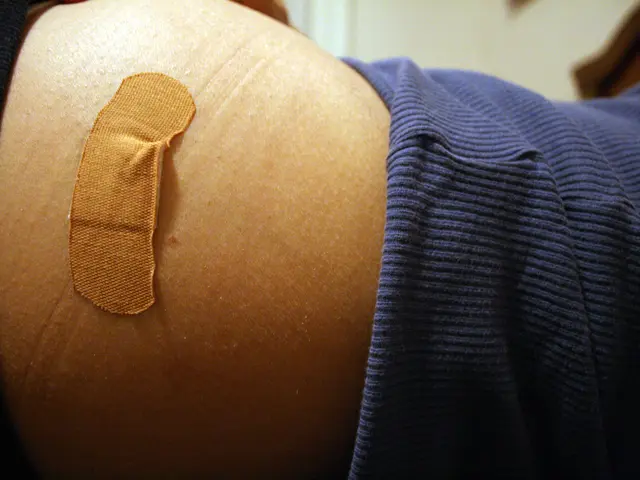Brain's Frontal Lobes Interrupted by COVID-19's Impact on Electrical Activity
A Look into Brain Abnormalities in COVID-19 Patients
Grab a cuppa as we delve into a fresh perspective on the effects of COVID-19 on the brain, based on research findings.
COVID-19 appears to be a formidable foe, wreaking havoc not just on lungs, but also on the brain. Approximately one in six patients with severe COVID-19 may develop neurological symptoms, encompassing headaches, delirium, impaired consciousness, seizures, and strokes.
When patients display neurological symptoms, doctors often refer them for an electroencephalography (EEG) test. This test involves sticking electrodes to the scalp to monitor the brain's electrical activity.
Researchers from Baylor College of Medicine and the University of Pittsburgh analyzed EEG results from 617 patients, revealed in 84 different studies. Interestingly, the most common findings were the slowing of brain waves and abnormal electrical discharges, occurring mainly in the frontal lobes of the brain.
Notably, the severity of the disease and pre-existing neurological conditions, such as epilepsy, seem to exacerbate EEG abnormalities.
The extent of these EEG abnormalities in the frontal lobes could be linked to the virus's likely entry point, the nose. Dr. Zulfi Haneef, a study co-author and neurology/neurophysiology assistant professor at Baylor, lends some insight: "The virus may not be solely responsible for all the damage. Systemic effects of the infection, such as inflammation, low oxygen levels, blood becoming unusually clotty, and cardiac arrest, could also contribute to EEG abnormalities that extend beyond the frontal lobes."
Other brain imaging techniques, like MRI or CT scans, might provide clearer images of the frontal lobe for further analysis, as suggested by Dr. Haneef.
Now, let's touch upon the buzzword sweeping the internet – "brain fog." People who have recovered from COVID-19 are reporting lingering health problems, colloquially known as "long COVID." Brain fog is one such issue.
A non-peer-reviewed study suggests that individuals who have had COVID-19 perform less thoroughly on an online cognitive test compared to those who haven't contracted the virus. Although this study does not verify that COVID-19 directly causes long-term cognitive decline, experts admit it raises concerns about potential lasting effects on the brain.
Why bother? Well, EEG abnormalities linked to neurological symptoms of COVID-19 infection only serve to heighten these concerns, asserts Dr. Haneef. "People often think they'll get sick, recover, and return to normal — but these findings hint at the possibility of long-term issues, which is a growing suspicion. On a more positive note, we found that more than half of those who had follow-up EEG tests showed improvements."
While this research sheds light on possible brain abnormalities in COVID-19 patients, it's important to note that it has certain limitations. These include a lack of access to raw data, doctors' potential omission of normal EEGs, and the skewed results resulting from focusing predominantly on patients with neurological symptoms.
Curious about the live updates on the coronavirus and COVID-19? Catch up here. Stay informed, stay safe!
Bonus Insights:- COVID-19's neurocognitive impacts might extend to brain regions like the temporal and frontal lobes, potentially influencing EEG readings.- A cytokine storm syndrome caused by severe COVID-19 may result in brain lesions and altered brain function, which could affect EEG patterns.- One study suggests that COVID-19 might cause a reduction in cortical thickness and thalamic volumes, hinting at changes in brain activity.- Although research points to COVID-19's potential effects on the brain, the correlation between COVID-19 and abnormal EEG results in the frontal lobes demands further investigation.
- One in six patients with severe COVID-19 may develop neurological symptoms that include epilepsy seizures, headaches, delirium, impaired consciousness, and strokes.
- When patients display neurological symptoms, doctors often refer them for an electroencephalography (EEG) test to monitor the brain's electrical activity.
- Researchers found that the severity of COVID-19 and pre-existing neurological conditions, such as epilepsy, seem to exacerbate EEG abnormalities, particularly in the frontal lobes of the brain.
- COVID-19 patients may experience brain fog after recovering, which could be related to potential long-term cognitive decline.
- Other brain imaging techniques, like MRI or CT scans, might provide clearer images of the frontal lobe for further analysis.
- The correlation between COVID-19 and abnormal EEG results in the frontal lobes demands further investigation to fully understand the potential neurocognitive impacts of the virus on mental health, neurological disorders, and overall health-and-wellness.








